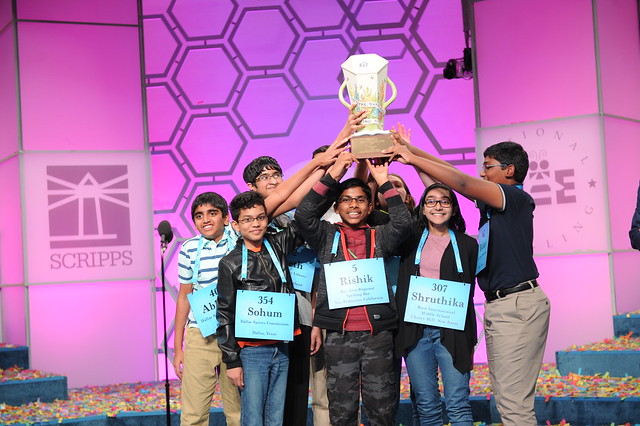National spelling bee champions are clearly talented kids. But a closer look reveals an important interplay of factors that have shaped their skills—and their moral character.


On May 30, eight—yes, eight!—cochampions bested the Scripps Spelling Bee in a shared victory of unprecedented size. The competition has seen six two-way ties in past years, but never such a massive stalemate. Among the final words they spelled were “bougainvillea,” “erysipelas,” and “auslaut.”
The kids who win Scripps have a lot going for them, including intellectual curiosity, self-motivation, and great long-term and working-memory skills. But they also have something else: family support.
In a recent New York Times piece, Pawan Dhingra, an Amherst College professor who is writing a book on the growth of extracurricular academics among young children, recounts the following:
I have met with scores of families, attended multiple spelling competitions and visited the homes of competitive spellers. These are happy, energetic, committed children. The notion that they are forced into this by their parents is a myth….I have sat with parents as they quiz their children on German root words, break for lunch, and then continue for hours. Families create their own word lists based on their appraisal of likely words. They purchase word lists. They read through books of nothing but prefixes. They hire coaches.
It’s clear that achieving success in a competition as fierce as the Scripps Spelling Bee would be impossible without parental encouragement and backing. For many participants, there’s a sense of cultural backing as well.
Seven out of eight of the 2019 Scripps winners are Indian Americans; in fact, every winner since 2008 has been of Indian descent. This phenomenon was explored in a Los Angeles Times article by Shalini Shankar, the author of Beeline: What Spelling Bees Reveal About Generation Z’s Path to Success and a Professor of Anthropology and Asian American Studies at Northwestern University. Noting that the culture itself is invested in competitive spelling, she writes,
Such deep involvement in a language arts activity may seem unusual for an immigrant community known for its prowess in science, technology, engineering and math (STEM). But I learned there is community prestige in placing competitively in spelling bees and great familial pride for having participated in something so challenging at a young age.
The South Asian Spelling Bee, a lesser-known contest held throughout the US for South Asian students, is often the first stop for future Scripps Spelling Bee winners. As interest in competitive spelling has grown within their community, Indian Americans have founded a variety of spelling coaching companies. And the appeal of academic competitions extends beyond spelling. Shankar writes,
Since 1993, the nonprofit North South Foundation has enrolled Indian American children in a variety of bees, including spelling, vocabulary, math, and geography. The 92 nationwide chapters were founded through word of mouth with no marketing or publicity—evidence of how this immigrant community shares information and knowledge about academic enrichment activities. More than 16,000 students compete each year.
Not only are these students receiving the message from their teachers that spelling is a worthwhile pursuit; they are also hearing the same (in spades) from their familial and cultural communities. The transmission of the same values from multiple sources compounds their power.
The kind of support that Indian American students enjoy from their parents and community is an example of what scholars James Davison Hunter and Ryan S. Olson call “social ecology.” Hunter and Olson explain this idea in the book The Content of Their Character, a study of character formation in American high schools, concluding that this dynamic has a broad impact on students both as learners and as people. They write,
There is considerable evidence that strong social support contributes crucially, if not decisively, to their academic success in school, whether that support comes from parents and family, youth organizations, or religious communities. The thickness of social ties also bears positively on the formation of a stable self-identity and, by extension, a child’s moral character.
For the Scripps spellers, the impact of their environment appears to have positively shaped their character as well as their spelling prowess. They rooted for one another in the last rounds, giving hugs and high-fives when others spelled their words correctly. Competitors have formed lasting friendships.
In his book The Death of Character, James Davison Hunter writes,
There is a body of evidence that shows that moral education has its most enduring effects on young people when they inhabit a social world that coherently incarnates a moral culture defined by a clear and intelligible understanding of public and private good.
In other words, although children like the Scripps spellers have strong support from home and from within their culture to be good students and good people, the attending encouragement from their teachers and other school leaders is vital. All elements of a “social world” work together as a single moral ecology in shaping character. And even when a family culture is healthy, the impact of a teacher is irreplaceable.